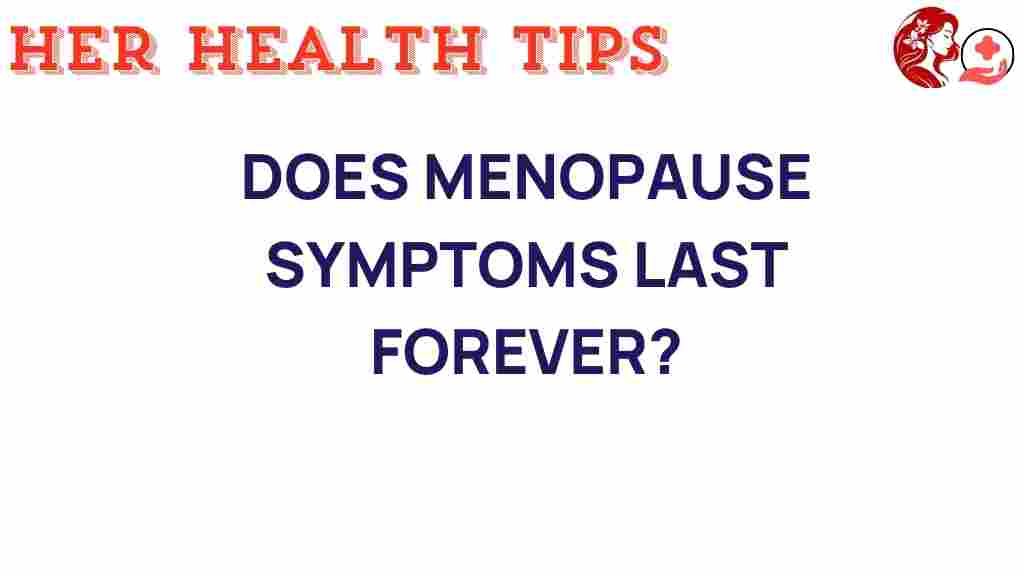Do Menopause Symptoms Ever Truly Fade? Exploring the Duration of Discomfort
Menopause is a natural phase in every woman’s life, marking the end of her reproductive years. However, it is often accompanied by a myriad of symptoms that can significantly impact a woman’s quality of life. These symptoms are tied to hormonal changes that occur during this transition, leading many to question: do menopause symptoms ever truly fade? In this article, we will unpack the duration of discomfort associated with menopause, explore various symptoms, and offer relief strategies to enhance women’s wellness.
Understanding Menopause and Its Symptoms
Menopause typically occurs between the ages of 45 and 55, with the average age being 51. It is characterized by the cessation of menstrual periods for 12 consecutive months due to a decline in the production of hormones such as estrogen and progesterone.
Common menopause symptoms include:
- Hot flashes
- Night sweats
- Vaginal dryness
- Sleep disturbances
- Mood swings
- Weight gain
- Memory problems
These symptoms can vary in intensity and duration from woman to woman, influenced by individual health, lifestyle factors, and genetics. Understanding the duration of these symptoms is crucial for managing them effectively.
The Duration of Menopause Symptoms
Menopause symptoms can begin in the perimenopausal stage, which may start several years before the actual menopause. The symptoms can persist for varying lengths of time:
- Short-term symptoms: Some women experience symptoms for only a few months to a couple of years after menopause begins.
- Long-term symptoms: Others may experience discomfort for a decade or more, particularly hot flashes and vaginal dryness.
Research indicates that about 75% of women experience hot flashes, and approximately 20% continue to have them for more than five years after their last period. Understanding these durations can help women prepare and seek appropriate support.
Factors Influencing Duration of Menopause Symptoms
Several factors can influence how long menopause symptoms last, including:
- Genetics: Family history can play a significant role in the severity and duration of symptoms.
- Health status: Conditions such as obesity, diabetes, and smoking may exacerbate symptoms.
- Lifestyle choices: Diet, exercise, and stress management can impact symptom severity.
- Hormonal changes: Variations in hormonal levels can affect how long symptoms last.
Addressing these factors may assist in alleviating symptoms and improving overall health during menopause.
Relief Strategies for Menopause Symptoms
While menopause is a natural transition, the discomfort associated with its symptoms can be challenging. Here are some effective relief strategies:
1. Lifestyle Modifications
Adopting a healthy lifestyle can significantly impact the severity of menopause symptoms:
- Diet: Incorporate a balanced diet rich in fruits, vegetables, whole grains, and lean proteins. Foods high in phytoestrogens, like soy products, may help mitigate some symptoms.
- Exercise: Regular physical activity can help manage weight, improve mood, and enhance sleep quality.
- Hydration: Staying well-hydrated can alleviate symptoms like dry skin and vaginal dryness.
2. Hormonal Therapies
Hormone replacement therapy (HRT) can be an effective option for women experiencing severe symptoms. HRT can help balance hormone levels and reduce hot flashes, night sweats, and vaginal dryness. However, it is essential to discuss the risks and benefits with a healthcare provider.
3. Alternative Therapies
Many women find relief through alternative therapies, including:
- Acupuncture: Some studies suggest that acupuncture may help reduce the frequency and severity of hot flashes.
- Herbal supplements: Black cohosh and evening primrose oil are popular options, though always consult a healthcare provider before starting any new supplement.
- Mind-body techniques: Practices such as yoga, meditation, and mindfulness can help manage stress and improve overall well-being.
Troubleshooting Common Menopause Symptoms
As you navigate menopause, you may encounter specific symptoms that require troubleshooting. Here are some common issues and potential solutions:
Hot Flashes and Night Sweats
If you experience frequent hot flashes and night sweats, consider the following:
- Dress in layers to help regulate body temperature.
- Avoid triggers like caffeine, alcohol, and spicy foods.
- Keep your bedroom cool and use breathable bedding.
Vaginal Dryness
To alleviate vaginal dryness:
- Use water-based lubricants during intercourse.
- Consider vaginal moisturizers that can be used regularly.
- Discuss with your healthcare provider about local estrogen therapy options.
Mood Swings and Sleep Disturbances
If you find yourself struggling with mood swings or sleep issues:
- Establish a consistent sleep routine.
- Incorporate relaxation techniques such as deep breathing or gentle yoga.
- Engage in regular physical activity during the day to promote better sleep.
Maintaining Quality of Life During Menopause
Menopause marks a significant transition in a woman’s life, but it does not have to diminish quality of life. Here are ways to maintain wellness during this period:
- Stay connected: Engage with friends and family for support. Sharing experiences can help ease the emotional burden of menopause.
- Educate yourself: Understanding menopause and its symptoms empowers you to make informed decisions about your health.
- Seek professional help: Don’t hesitate to reach out to healthcare providers for tailored advice and treatment options.
For further reading on women’s health and wellness, visit this resource.
Conclusion
In conclusion, the duration and intensity of menopause symptoms can vary widely among women. While some may find that their discomfort fades within months, others may experience symptoms for years. By adopting effective relief strategies and understanding the factors that influence symptom duration, women can improve their health and wellness during this transitional period. Remember, menopause is a natural part of life, and with the right support and resources, it can be navigated smoothly, allowing you to maintain a high quality of life.
For more information on menopause and women’s wellness, check out this article.
This article is in the category Reproductive and created by HerHealthTips Team
